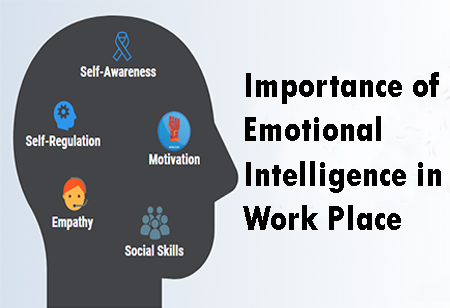Importance of Emotional Intelligence in the Workplace
By Tanuja A Akkannavar
 Emotional Intelligence is the capacity of an individual to express and control his/her emotions, also to accept and maintain emotional stability with others. With the increasing competition and the stress caused due to this race, maintaining emotional stability at the workplace is turning a little difficult for the young individuals of the present era. Elucidating about Emotional Intelligence is a basic component of understanding and accepting own emotions and others to an extent. The five elements of emotional intelligence are namely self – awareness, self – regulation, motivation, empathy and social skills. Concentrating on these five elements makes a person gain emotional stability at the workplace, let us know more about the elements of emotional intelligence:
Emotional Intelligence is the capacity of an individual to express and control his/her emotions, also to accept and maintain emotional stability with others. With the increasing competition and the stress caused due to this race, maintaining emotional stability at the workplace is turning a little difficult for the young individuals of the present era. Elucidating about Emotional Intelligence is a basic component of understanding and accepting own emotions and others to an extent. The five elements of emotional intelligence are namely self – awareness, self – regulation, motivation, empathy and social skills. Concentrating on these five elements makes a person gain emotional stability at the workplace, let us know more about the elements of emotional intelligence:
1. Self – Awareness:
The concept of self-awareness is all about knowing and accepting their strengths and weaknesses very well. The individuals with high emotional intelligence can hold their emotions very well and do not let them go out of control at any moment, also he/she seems to be very confident with their decisions. A person who can understand their own emotions will be able to improve themselves in a better way and self-awareness is one of the important factors to enhance emotional intelligence.
2. Self – Regulation:
Self – regulation is a way of controlling emotions, an individual will think before acting. A person will regulate himself, evaluate their thoughts and decisions and then proceed forward with a valid conclusion. And most importantly they do keep the ability to be straight forward and denying or saying no to things which they think are not convincing.
3. Motivation:
The element of keeping yourself motivated makes you achieve any task without any complications. Staying motivated at the workplace is very important as there is much stress and work pressure, and at times when you face a challenge, self-motivation will help you in finding a solution to that challenge. Also when you stay motivated you can accomplish the tasks assigned to you with higher efficiency and prove your strengths at the workplace.
4. Empathy:
This is another important factor in maintaining high emotional intelligence in the workplace. When you try to understand your co-worker's situation and try to help them in finding a solution is known as showing empathy. The element of being empathetic is very important to any leader, by listening to the concepts of the teammates and understanding their viewpoints will result in a productive and effective outcome. This element will play a vital role in maintaining a good relation and communication at the workplace.
5. Social Skills:
Another important element of maintaining high emotional intelligence is having excellent social skills. An individual needs to put forward their ideas, requirements or queries, henceforth social skill such as communicating and conveying it to the co-workers respectively. An individual with high social skills can strongly present his/her thoughts or decisions to their teammates or the subordinates. Also, when you communicate with your leaders and suggest or place your ideas it will highlight your involvement towards work or task assigned.
Individuals can work and improve their emotional intelligence in the workplace. The ways to develop your skills and maintain emotional intelligence at the workplace are mentioned below-
- Try to find out your strengths and weaknesses at work and also put an effort to improve yourself in those areas that you feel you are lacking in. Adding to this make your strengths visible to your team leaders or co-workers which will help you in gaining value for your work.
- Think before you react. When you are putting forward your thoughts or ideas think about how the person opposite to you may react. If the person does not accept it or wants any changes in it, try to understand their viewpoint and accept it. In some cases, you need to convey your message in a way that the other person will think or his point of understanding and accepting things.
- Try to observe how people react to you and the way you respond back to them.
- By evaluating the conflicts or challenges with a motivated attitude you may find it simple and discover a solution easily. Do not complicate things that can be resolved easily.
- Put all your efforts into putting forward your ideas and communicating it to others, sometimes it may bring recognition to you at the workplace and help you to gain more good opportunities to showcase your work performance.
Today, with increasing competition and stressful environment at workplace, maintaining high emotional intelligence is very important. One needs to be emotionally fit and strong to face every kind of challenge and situation. Emotional Intelligence shows your ability to leading and managing things at the workplace.




